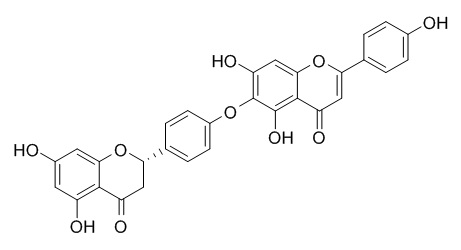2,3-Dihydrohinokiflavone
2,3-Dihydrohinokiflavone is a suppressor of matrix metalloproteinases (MMPs) gene expression. It (IC50 =1.6uM) shows strong activity against Leishmania.
Inquire / Order:
manager@chemfaces.com
Technical Inquiries:
service@chemfaces.com
Tel:
+86-27-84237783
Fax:
+86-27-84254680
Address:
1 Building, No. 83, CheCheng Rd., Wuhan Economic and Technological Development Zone, Wuhan, Hubei 430056, PRC
Providing storage is as stated on the product vial and the vial is kept tightly sealed, the product can be stored for up to
24 months(2-8C).
Wherever possible, you should prepare and use solutions on the same day. However, if you need to make up stock solutions in advance, we recommend that you store the solution as aliquots in tightly sealed vials at -20C. Generally, these will be useable for up to two weeks. Before use, and prior to opening the vial we recommend that you allow your product to equilibrate to room temperature for at least 1 hour.
Need more advice on solubility, usage and handling? Please email to: service@chemfaces.com
The packaging of the product may have turned upside down during transportation, resulting in the natural compounds adhering to the neck or cap of the vial. take the vial out of its packaging and gently shake to let the compounds fall to the bottom of the vial. for liquid products, centrifuge at 200-500 RPM to gather the liquid at the bottom of the vial. try to avoid loss or contamination during handling.
Pharmacognosy Journal2019, 11(2): 369-373
J Ethnopharmacol.2023, 317:116789.
Phytochem Anal.2021, 32(6):970-981.
J Chromatogr B Analyt Technol Biomed Life Sci. 2017, 1064:115-123
Plants (Basel).2020, 9(11):1555.
Int J Mol Sci.2023, 24(3):2102.
Sains Malaysiana2024, 53(4):795-805
Phytofrontiers2024, 2690-5442.
Int J Food Sci Nutr.2019, 70(7):825-833
J Ethnopharmacol.2020, 249:112396
Related and Featured Products
Phytochemistry Letters,2008,1(4):171-4.
Antiplasmodial and leishmanicidal activity of biflavonoids from Indian Selaginella bryopteris[Reference:
WebLink]
A series of eleven biflavonoids containing amentoflavone and hinokiflavone derivatives from the Indian medicinal herb Selaginella bryopteris has been investigated for their antiprotozoal activity using in vitro assays against the K1 strain of Plasmodium falciparum, Leishmania donovani, Trypanosoma brucei rhodesiense and Trypanosoma cruzi.
METHODS AND RESULTS:
The highest antiprotozoal activity was displayed by 7,4′,7″-tri-O-methylamentoflavone which exhibited an IC50 of 0.26 μM. This compound showed no significant cytotoxicity (IC50 > 150 μM) evaluated using L-6 cells. The strongest activity against Leishmania was detected for 2,3-Dihydrohinokiflavone (IC50 = 1.6 μM), whereas for Trypanosoma no significant activity was observed (IC50 > 12.5 μg/mL for the extract). To evaluate the in vivo activity against Plasmodium of the most active compound, trimethylated amentoflavones were obtained by partial synthesis starting from amentoflavone.
CONCLUSIONS:
The synthesized mixture of trimethylated amentoflavones did not show activity in the Plasmodium berghei mouse model against female NMRI mice at 50 mg/kg.
Journal of Lifel Sciences,2005,15(2):231-5.
Suppression of Matrix Metalloproteinase-9 Expression of Flavonoids from Metasequoia glyptostroboides[Reference:
WebLink]
Matrix metalloproteinases (MMPs) are a family of structurally and functionally related zinc-dependent enzymes responsible for proteolytic degradation of extracellular matrix components such as base membrane or interstitial stroma. MMPs play an important role in a variety of physiological and pathological tissue remodeling processes, including wound healing, embryo implantation, tumor invasion and metastasis. Since MMP-9 (gelatinase B) has unique ability to cleave type IV collagen, gene expression of MMP-9 has been focused on as a pharmacological target.
METHODS AND RESULTS:
Flavonoids are a class of compounds that are widely spread in plants. In the coures of screening for the suppressors of MMP-9 gene expression from natural products, Metasequoia glyptostroboides was selected. Six flavonoids, sciadopitysin, isoginkgetin, bilobetin, 2,3-Dihydrohinokiflavone, luteolin and apigenin were purified as suppressors of MMP-9 gene expression from M. glyptostroboides.
CONCLUSIONS:
The suppressing activity of the isolated flavinoids on the MMP-9 gene expression was measured by gelatin zymography and Nothern blot analysis.



